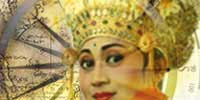|
JAKARTA (indo.com): A unique phenomenon occurs every year
in Indonesia, one which is culturally so sacred to Muslims
that no one want to miss the moment. After fasting for the
whole month in Ramadhan, there is a big gift for every Muslim.
Lebaran is that white gift, and the day when all Muslims
forgive each others' faults.
One of the celebrations of Lebaran is Mudik. In order to
reunite with parents and families, millions of migrants
from big cities like Jakarta make long queues for train
and bus tickets, jump into any overloaded transportation
vehicles they can find and get stuck for hours in traffic
jams. For them, all the pain and inconvenience is nothing
but a small hazard of the home-sweet-home journey. In fact,
the journey itself is often an interesting story to tell
to the families back home.
Migrants from the same village usually do Mudik together.
Companies provide free buses or rented cars for employees
so that they can travel in comfort, and also feel the spirit
of togetherness. A week or even a month before Lebaran,
rented cars, bus tickets, and train tickets are already
fully booked. Everybody is going everywhere.
 Traffic
jams abound during the week before and after Idul Fitri.
The police have to work extra hours to keep everything in
order, their annual security drive often being called 'Operation
Ketupat Lebaran'. Ketupat is a traditional meal cooked specially
for this festival. Traffic
jams abound during the week before and after Idul Fitri.
The police have to work extra hours to keep everything in
order, their annual security drive often being called 'Operation
Ketupat Lebaran'. Ketupat is a traditional meal cooked specially
for this festival.
Mudik is an annual tradition that is an inseparable part
of life in Indonesian communities. Lots of people who try
to make a living in big cities come home only on Lebaran
or Idul Fitri holidays. Usually, they'll visit their ancestors'
graves to tend to them and give prayers to the spirits of
the dead. Mudik is also a kind of therapy which serves to
revitalize family relationships. In its spiritual aspect,
it generates a new freshness, which instils the migrants
with new vigor when they return to their work in the big
cities.
People working away from home in big cities often feel something
is lacking in life, and this "lost something" can be rediscovered
at times when migrant citizens return home to their villages.
Mudik is therefore both an annual tradition and also harbors
a remedial "side effect" or therapy for the sense of loss
in urban life.
Mudik also functions as an information network about job
opportunities in big cities, though this causes problems.
Urban populations increase annually when the migrants return
from their annual holiday, as domestic servants often bring
along two or three relatives to partake of the "urban success
story". Urban migrants back in their villages tell family
and friends of their successes in the big city and show
off their newfound "wealth". This inspires dreams about
what urban life has to offer those having the courage to
leave their homes, resulting in a constantly moving flow
to the cities, an illusion of a new lifestyle and new hopes.
| 






